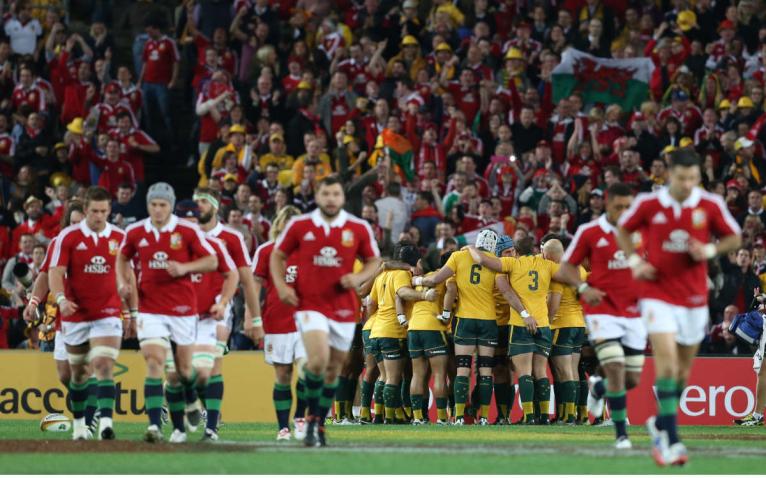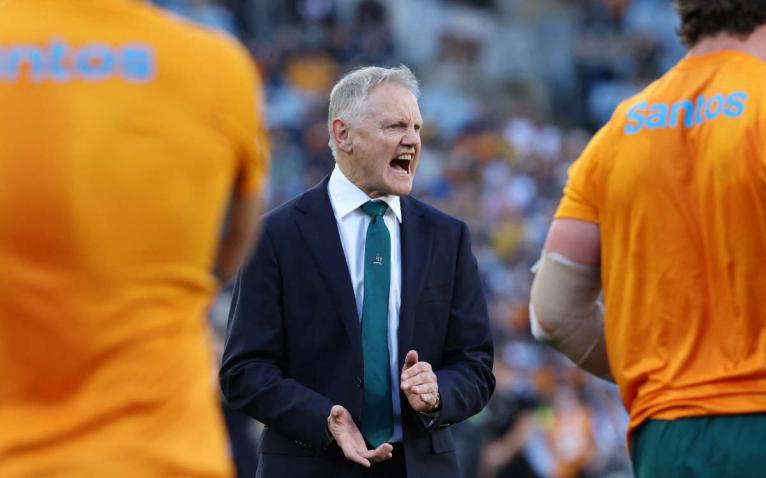The rugby world is worried about Australia – starting with their ability produce quality Super Rugby teams and by extension, a competitive Wallabies team to play the British and Irish Lions next year.
There are concerns about their ability to keep their public engaged in the 2027 World Cup such are the troubles the Wallabies are having in winning Tests and passing themselves off as a credible rugby force.
There are concerns, too, about Rugby Australia’s financial viability given it is having to make punitive interest payments on an $80m loan facility it set up with an Australasian fund manager.
The possibility of a prolonged and potentially expensive legal battle also now looms with the directors of the Melbourne Rebels who have lodged court proceedings against Rugby Australia, suing the national body for $30m of damages.
RA has counter-sued, saying the club – which has gone into administration and is no longer part of Super Rugby – hid its true financial position. If nothing else, a PR toe-curler looms.
And all these worries have been deepened by the confirmation that New Zealand and South Africa are going to tour each other’s countries every four years in an agreement that leaves considerable doubt about the viability of the Rugby Championship and just who exactly the Wallabies are going to be playing between 2026 and 2030.
Australia will feel left out after the Springboks and All Blacks announced tours in 2026 and 2030 (Photo PHILL MAGAKOE/Getty Images)
These are not baseless fears. Australia has suffered a dramatic fall from grace since the heady days of winning two World Cups in the 1990s and making the final of the 2003 tournament which they so brilliantly hosted.
The statistics when they are laid bare, make grim reading. Australia hasn’t had a Super Rugby champion since 2014. They haven’t won the Rugby Championship in a ‘normal’ year – their only success coming in the truncated 2015 tournament.
They haven’t held the Bledisloe Cup since 2003 or beaten the All Blacks in New Zealand since 2001.
What’s most worrying for Australian rugby fans, though, is that their decline has been faster and more intense since 2020.
They have managed just one victory against the All Blacks in 12 Tests since 2020, they failed to get out of their pool at the 2023 World Cup and they now sit a record low ranking of 10th, having fallen to a record 67-20 defeat to Argentina during The Rugby Championship.
It looks gloomy and uncertain, but perhaps the nadir has been reached and perhaps a recovery is not as far away as it seems.
Whether it’s a symptom or a cause of this rapid recent decline, Rugby Australia also saw broadcast income drop from around $54m a year in 2020 to $29m a year in 2021 when it became clear broadcasters were not queuing up to buy rugby rights.
And with less money coming in, Australia entered a vicious debt cycle in 2021, having to borrow $80m at interest rates believed to be in excess of 10 per cent, which meant there was no ability to save the Melbourne Rebels earlier this year.
It looks gloomy and uncertain, but perhaps the nadir has been reached and perhaps a recovery is not as far away as it seems.
Rugby Australia chief executive Phil Waugh certainly doesn’t think all is lost, not when the forecast is that the Lions tour and two World Cups will net RA around $225m in profit.
That’s enough cash to get out of debt, and arguably, losing the Rebels gives RA a more sustainable cost base to maintain, and a better chance of staying out of debt.
Despite clear challenges, RA Chief Executive Phil Waugh insists there is much to look forward to in the coming years (Photo by Cameron Spencer/Getty Images)
“We have got a debt profile that we are managing and we need to pay that debt back,” Waugh says.
“Then we need to go into a new broadcast cycle and we need to have a sustainable game so the money we make there, we can invest into a legacy fund that we can invest back into the community game.
“You can’t keep living on future revenues. You have got to get to a sustainable model.
“The economics of the game are not sustainable as they were. It’s a combination of how do you maximise your commercial revenue and get to a cost base that matches your revenue?
“We have all been living beyond our means and trying to stay with player inflation and obviously the leagues across the world are feeling it.”
Australia’s stroke of luck or good management, depending on who you believe – is that they rejected/were rejected from doing a private equity deal a couple of years ago, which means they have not sold a share of their revenue to a third party in perpetuity the way New Zealand Rugby has.
What Australia earns Australia will keep and this may prove significant over the long term as doubts start to grow about whether the private equity sales in Europe, New Zealand and South Africa were the right moves.
Right now, we are very comfortable with the path that we are on. My focus is on setting the game up in perpetuity and the longevity of the game, not on short term commercial sugar hits.
Phil Waugh, ARU Chief Executive
“We explored it,” Waugh says of doing a private equity deal. “But given what we had coming down the pipeline, given the equity markets and the multiple at the time on the enterprise value, we decided to go down the debt path.
“Right now, we are very comfortable with the path that we are on. My focus is on setting the game up in perpetuity and the longevity of the game, not on short term commercial sugar hits.”
The question, however, will be how much, excluding the showpiece events, can Australia harvest in the coming years? Can they up their broadcast deal from its current, unsustainable figure of $29m a year (supplemented by $8m from NZR as part of a Super Rugby revenue sharing agreement)? And will improved balance sheet lead to an improvement on the high-performance front?
So much will depend on three things. Firstly, the future shape and geographic footprint of Super Rugby will be critical.
RA needs to be selling broadcasters a competition that is compelling and viable, which means a long-term solution needs to be found to the current problem of having only 11 teams.
Waugh also says that the onus is on Australia to improve its performance to engage fans and to reconnect the Super Rugby clubs with the grassroots.
“The platform is burning right because 11 teams does not work and I think everyone recognises that.
“We are playing over a longer period and playing less games in 2025. You just need to go through the history of Super Rugby and the different iterations and you understand why the relevance has been lost somewhat.
“I think one of our biggest challenges, is for the last 15 years we have drifted further apart from the community game, to the club game to the professional game.
“We used to have the community and clubs come and watch their players play for the Super Rugby team and we need that fully integrated model where the clubs are proud of their players because they are playing for the Super Rugby team.”
Secondly, broadcasters are going to need confidence in the international schedule the Wallabies will be able to put together in the next cycle given there will be no Rugby Championship in 2026 and 2030.
Again, though, the news is better on that front than has been reported. An agreement has been reached with NZR to play at least two Beldisloe Cup tests in those years, and possibly a third if a viable way to play an Anzac test in mid-April during Super Rugby can be signed off.
Waugh is confident that with four viable Super Rugby teams, and Joe Schmidt installed as Wallabies head coach, that performance will improve significantly in the coming years.
In addition, South Africa have agreed they will send a full-strength Springboks team to Australia in 2026 and 2030, with Waugh saying that other fixtures with Argentina, Japan and Fiji will be agreed.
The Australians, despite their lack of success, still love the Bledisloe with 70,000 turning up to watch the first encounter in Sydney this year and it remains a highly marketable and valuable property.
Likewise, a one-off Test against the Boks will be easier to promote than a Rugby Championship two-Test series, for the simple reason the Wallabies will have a higher probability of winning a single game than going back-to-back against the world champions.
Which builds into the third thing RA must sell to prospective buyers of the broadcast rights – a winning Wallabies team.
That’s the hardest thing of all to believe in given their only victories in the last two years have come against Georgia, Portugal, Wales and Argentina. Their record is six wins from 18 Tests and that doesn’t bode well to entice broadcasters into writing a big cheque.
But Waugh is confident that with four viable Super Rugby teams, and Joe Schmidt installed as Wallabies head coach, that performance will improve significantly in the coming years.
Schmidt is certainly a proven talent, and there have been signs of his influence having had an impact with the Wallabies winning in Argentina and then pushing the All Blacks as close as they did in Sydney, before producing arguably – despite the 33-13 scoreline – their strongest, most innovative and compelling performance of the year in Wellington.
There were supremely good passages of pick and drive by the forwards; the scrum held up; the exit plays of going wide-wide inside their own 22 broke the All Blacks plenty of times and it was clear to anyone who understands the game, that the Wallabies are a side on the improve and one with huge potential now that Schmidt is coaching them.
There’s a long way to go, but Harry Wilson is growing into a quality No 8, Fraser McReight is up there with the best sevens in the world, Noah Lolesio is maturing at No 10, Hunter Paisami is becoming a world class No 12 and Andrew Kellaway and Tom Wright would add value to any back three.
Waugh says: “We know we are not holding up our end of the bargain on performance but we are doing everything we can to fix that.
“We have got a big country with a big population and a big GDP. We breed good athletes we just have to make they want to play rugby, and we have got the right structures around them and that we are setting the system up for success.
“There is a lot to like about Australia. It becomes very lonely if we are not competitive for rugby in New Zealand.”
Copyright for syndicated content belongs to the linked Source linkThe post The rugby world is concerned about Australia but signs of recovery are palpable first appeared on Rugby 247.
Author : rugby-247
Publish date : 2024-10-15 21:18:12
Copyright for syndicated content belongs to the linked Source.